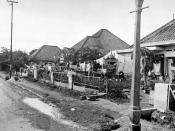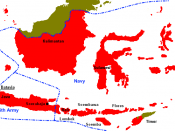How far did the Japanese Occupation change the lives of the people in Southeast Asia?
The lives of the people were changed to a large extent. It gave the general populace hope for independence as the Japanese Occupation destroyed the myth of Western superiority. It also gave the natives resolve to fight for independence and be free from external control instead of working under harsh conditions. However, the Japanese Occupation did little to change existing tensions between different racial and regional groups.
Firstly, before the Japanese Occupation, the locals were resigned to being subjected to colonial rule. This was clearly seen by the difficulties nationalist leaders faced to recruit the support of the masses. However, the humiliating British defeat and French concession dispelled the myth of Western superiority. The British were overconfident of their abilities and severely underestimated the Japanese, even citing their poor eyesight as a reason to why they could not be good fighter pilots.
With their resources spilt between protecting their colonies in Southeast Asia and their homeland in Europe, they quickly lost Malaya to the Japanese within three months. Although the French were not defeated outright, the French administration in Vietnam was controlled by the Japanese in that they were allowed to use French Indochina territory for Japanese purposes. As a result, the nationalist leaders were able to garner mass support through the shared suffering and in doing so negotiate independence, hence changing the lives of the people. Local resistance movements that went beyond ideological differences were formed during the Japanese Occupation, such as the MPAJA in Malaya and the Vietminh in Vietnam, which appealed to communists and non-communists alike, and made the fight for freedom a greater reality for the vast majority of the local population who had been previously politically apathetic towards...


